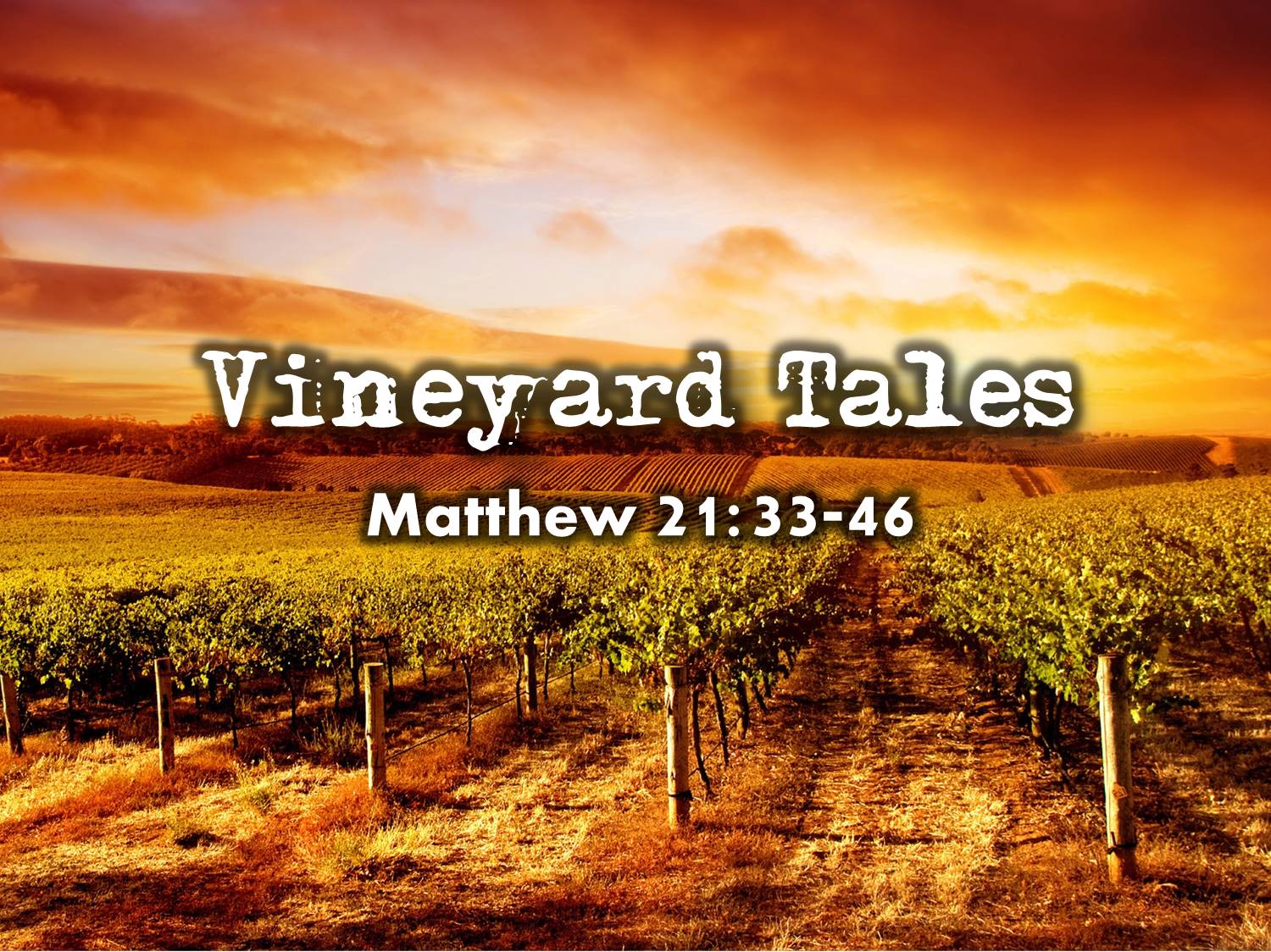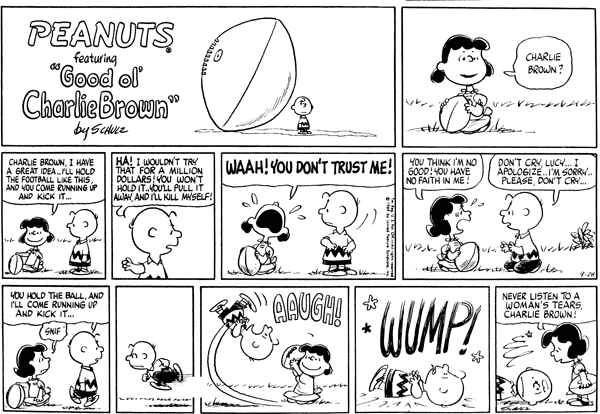Vineyard Tales (Matthew 21:33-46)
After being confronted by the chief priests and the elders--representatives of the Sanhedrin--and asked to justify his authority, Jesus continued his response with another parable. He reminded them of an ancient Israel tradition: the telling of Vineyard Tales.
“Listen to another parable. There was a landowner who planted a vineyard, put a fence around it, dug a wine press in it, and built a watchtower. Then he leased it to tenants and went to another country. When the harvest time had come, he sent his slaves to the tenants to collect his produce. But the tenants seized his slaves and beat one, killed another, and stoned another. Again he sent other slaves, more than the first; and they treated them in the same way. Finally he sent his son to them, saying, ‘They will respect my son.’ But when the tenants saw the son, they said to themselves, ‘This is the heir; come, let us kill him and get his inheritance.’ So they seized him, threw him out of the vineyard, and killed him. Now when the owner of the vineyard comes, what will he do to those tenants?” They said to him, “He will put those wretches to a miserable death, and lease the vineyard to other tenants who will give him the produce at the harvest time.”
Jesus said to them, “Have you never read in the scriptures:
‘The stone that the builders rejected has become the cornerstone; this was the Lord’s doing, and it is amazing in our eyes’?
Therefore I tell you, the kingdom of God will be taken away from you and given to a people that produces the fruits of the kingdom. The one who falls on this stone will be broken to pieces; and it will crush anyone on whom it falls.”
When the chief priests and the Pharisees heard his parables, they realized that he was speaking about them. They wanted to arrest him, but they feared the crowds, because they regarded him as a prophet.
When you hear the word repentance, what is the first thing that comes to your mind? Guilt? The feeling of sorrow for having done something wrong? Deep contrition (if you like to use a big word from a favorite hymn, even if you're not really sure what it means)? Vineyard Tales are always about repentance.
Over the years I have come to realize that many people do not clearly understand what the word repentance means. That makes it easy to miss the point of these Vineyard Tales. The original word for repentance in Greek is metanoia, which means to "turn around" or to "change your mind." The misunderstanding of the word in the west can be traced to a very early Latin mistranslation of scripture, which one scholar has called, "linguistic and theological tragedy."
For some help, let me borrow this lesson from Peanuts.
Even though he knows better, Charlie falls for it every time.
We might be tempted to claim that Lucy's tears were insincere. In other words, she just flat out lied to Charlie: "Never listen to a woman's tears, Charlie Brown!" Whether her tears were sincere or not is beside the point. But this illustrates our confusion quite well. Our confusion comes from our inability to properly distinguish the feeling of sorrow from our words of confession and acts of repentance. Sorrow, is a feeling we get. Confession is our practice of admitting we have done something wrong. Repentance is an actual change in mind that is evidenced in a change of action.
If, in Lucy's tears, she says she is sorry, this would properly be called a confession. But it is not repentance. Repentance only comes with an actual change in our actions. Lucy has not repented because she has not done anything different. Metanoia, real repentance, is not about our feelings. It actually requires that we do something different. It means making a "u-turn." It means turning around and working to put things right, just as they should be!
What does this have to do with the Vineyard Tales and Jesus' teachings about the absentee landlord, the servants, and those wicked tenants? Well, everything.
Many commentators will remind us that Jesus' parable of the vineyard is a clear references to Isaiah 5. These two Vineyard Tales are set up the same. We have a vineyard, complete with a fence and a tower. In Isaiah, the vineyard has been properly cared for, but it has produced wild grapes. The vineyard, Isaiah explains, represents Israel, and soon it will be overtaken by foreigners. This judgment, as Isaiah says, is because God "looked for justice but found only bloodshed; righteousness but only heard crying" (Isaiah 5: 7, my translation).
We could easily follow this reference back to the original Vineyard Tale, the story of the Garden of Eden with Adam and Eve in Genesis 2-3. And I think going back to the beginning of the story is always a good place to begin. God had placed Adam and Eve in the garden and given them dominion over it (Genesis 1:26). But they were not content with merely being caretakers who were made in God's image. Having been tempted by the serpent, they actually wanted to "be like God" and do as they pleased. They were not content with being caretakers, they wanted to be gods.
Today, we are no different. If we are honest, most of us are not content with merely being caretakers made in God's image. Like Adam and Eve, we are like most of the world, we would rather play gods and then claim that God must be like us. And this is the underlying problem at the heart of the Vineyard Tales: To whom does the vineyard actually belong?
 Carol Adams, in her chapter of A Faith Embracing All Creatures, writes that most of us confuse the word dominion with domination. She explains,
Carol Adams, in her chapter of A Faith Embracing All Creatures, writes that most of us confuse the word dominion with domination. She explains,
It has been said that if kings and queens exercised dominion over their subjects the way human beings do over the other animals, kings and queens would have no subjects. So why is being in God's image often interpreted in view of power, manipulation, and hegemony instead of compassion, mercy, and emptying unconditional love? We often anthropomorphize God as powerful, fierce, and angry (if not belligerent). When we are lording over others, using power--it is then that we are most likely to assert the image of God. Acts of unconditional love, suspensions of judgment, mercy for the week, and kindness to animals get associated with a wishy-washy picture of who Jesus was, but are rarely discussed regarding God the Creator. ("What about Dominion in Genesis?" p. 2)
And here is where our Vineyard Tales come into focus--where repentance, the Garden of Eden, Isaiah's prophetic picture of the vineyard, and Jesus' parables all fit together. In the Gospel of Matthew, Jesus has been reworking everything. He has been forming a new community (the ekklesia) that is rooted in the Kingdom of Heaven, rather than modeled after the oppressive kingdoms of this world. At this point in the Gospel of Matthew, Jesus has brought his teachings right into Jerusalem, right to the feet of those who claim to be caring for Israel and speaking for God, right to the Sanhedrin. These leaders of Israel have gone about reproducing the same kind of systems of authority, injustice and oppression--modeled after the kingdoms of this world--that Isaiah had criticized the leaders of Israel for all those years ago. Rather than being caretakers, made in God's image, they had chosen to be like gods.
When confronted with the parable, it must have been obvious. In reality, the Sanhedrin were absentee landlords. They owned the land. They were given the say-so. Even though they did little of the work, they depended on the labor of the rest of the community. In turn, the rest of the community depended on the Sanhedrin's generosity to survive. But Jesus called them as they actually were--wicked tenants. Insert here the words of Isaiah, and the full effect of the parable comes forth: "The Lord looked for justice but found oppression; righteousness but only heard crying."
But, the Vineyard Tales continue...
All throughout Christian history, this interpretation has been taught by the Church. The wicked tenants were the Sanhedrin, the "leaders of the Jews"; God was the absentee landlord; the master's servants who were killed were the prophets; and the son who was killed was Jesus--the cornerstone. And, as John Chrysostom (c. 347 – 407) boldly articulates in his commentary on Matthew, this parable shows that in Jesus we find "the calling of the Gentiles, the casting out of the Jews."
Oh, the damage this way of thinking has done!!! In their interpretation of this very passage, we can see where leaders all throughout the history of the Church have failed to listen to Jesus. "The Jews," they say, "are the wicked tenants. They killed Jesus. But God chose us. Lucky us! Let's go kill some Jews." (See, for example, the medieval accusations of Christians against Jews who were claimed to have desecrated the host.)
But, you see, by passing off the blame onto another community, the Church failed to hear the criticism of Jesus. As long as "the Jews" are the bad guys in story, Christians get let off of the hook. We no longer have to ask the questions about ourselves in the text. We have robbed ourselves of Jesus' words, words aimed at teaching us how to repent. Even more, we turn Jesus' words into justification for centuries of anti-Semitism, centuries of hatred, centuries of murder in the name of Jesus. God forgive us!!!
For two thousand years, what the Church has largely failed to take seriously is that Jesus' accusation that the Sanhedrin are the wicked tenants is also an indictment against us all. We are all guilty of claiming that God-given dominion justifies God-ordained domination! The systems of this world carry swords that smell of ages of rotting flesh! No, this is not Jesus' accusation against the Jews. It is God's charge against us!!! They are words especially against us, the Church, who claim with our mouths that we follow Jesus, but know in our hearts we would rather have Jesus follow us. And the use of this passage to justify centuries of hatred is only evidence of how far we have fallen.
Thankfully, our God is gracious, slow to anger, and abounding in mercy.
There are two things to take away here.
 First, thankfully, many Christians today are probably not guilty of personal hatred. Many of us, including myself, have spent years talking about Jewish-Christian reconciliation. But for the Church as a whole, we must do more than talk. Confession does not equal repentance. If we are serious about following Jesus, we cannot just speak repentance with our mounts--we actually have to do something about it. And every time I come across a passage like this in the text which has been historically misused as a weapon against our Jewish brothers and sisters, I am going to do my best to point it out and publicly acknowledge our need for repentance.
First, thankfully, many Christians today are probably not guilty of personal hatred. Many of us, including myself, have spent years talking about Jewish-Christian reconciliation. But for the Church as a whole, we must do more than talk. Confession does not equal repentance. If we are serious about following Jesus, we cannot just speak repentance with our mounts--we actually have to do something about it. And every time I come across a passage like this in the text which has been historically misused as a weapon against our Jewish brothers and sisters, I am going to do my best to point it out and publicly acknowledge our need for repentance.
If you have been to the Holocaust museum in Manhattan or D.C., you have probably heard this phrase. It summarizes the heart of what I think the response to this parable ought to be, what repentance is all about: "Never again!" Never Again, if the Church would listen, is a message directed toward us, calling us to make that "u-turn"--to repentant.
Secondly, the core of the teaching of Jesus' parable still stands. Like Adam and Eve, we have been put in a garden--a good world created by a good God--and asked to be its caretakers. We rightfully claim dominion over God's gifts to us. But instead of caring for them, we often go further and use our dominion as justification to dominate. And of this, we must repent.
This is God's world, and we are merely its caretakers. This is the takeaway from the Vineyard Tales. I pray that this Sunday we will hear Jesus' call. We, especially those of us who identify with the Church, have a lot of work to do. History is behind us. The servants have already been slain. The vineyard has been trampled on and abused. But, in Jesus' words, God has called us to be a people of repentance. That does not mean that we necessarily need to feel shame for something we personally have done wrong. No, it means that we begin with a new mind and a new heart, looking at the mistakes that have been made and saying, "never again!"

